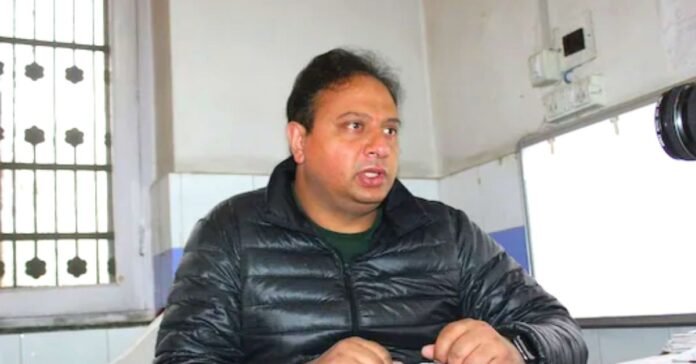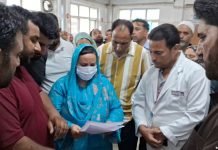
SRINAGAR — Immunocompromised individuals, including those with weakened immune systems due to underlying health conditions, medical treatments, or age, are at a higher risk of contracting pneumonia, according to Dr Naveed Nazir Shah, pulmonologist and Head of the Department at CD Hospital, Srinagar.
In an interview with the news agency KNO, Dr Naveed said that while pneumonia can affect anyone, those with compromised immune systems are particularly vulnerable due to their body’s reduced ability to fight infections.
“Pneumonia is an infection that causes inflammation in the air sacs of one or both lungs, which can fill with fluid or pus. This leads to symptoms such as cough, fever, chills and difficulty breathing,” he said.
He added, “While anyone can develop pneumonia, it is especially dangerous for individuals whose immune systems are not functioning optimally, such as those with chronic illnesses, those undergoing treatments like chemotherapy or the elderly.”
The noted pulmonologist explained that immunocompromised individuals are at an increased risk due to several factors, including a weakened immune response, increased exposure to opportunistic infections and a higher likelihood of developing complications. This group includes people with conditions like HIV, cancer and autoimmune diseases, as well as those taking immunosuppressive medications or undergoing organ transplants, he said.
Dr Nazir called for early intervention, saying that symptoms such as continuous cough, high fever, chest pain and shortness of breath should be immediately evaluated by healthcare professionals to avoid complications.
When asked about the prevention and management of pneumonia, Dr Naveed called for vaccinations, particularly for immunocompromised individuals. “Vaccination against pneumonia-causing pathogens is crucial for those at high risk. These vaccines can help prevent bacterial and viral infections,” he said.
He said that antibiotics are typically indicated only for bacterial infections or for high-risk patients with viral infections that may lead to secondary bacterial pneumonia. For most viral infections, symptomatic treatment or antiviral medications are usually sufficient, he said.
According to Dr Naveed, pneumonia can be caused by a variety of pathogens, including bacteria, viruses and fungi. “The most common causes of pneumonia are bacterial, viral, and fungal infections. Factors such as age, chronic diseases (like COPD, diabetes, heart disease), smoking, and excessive alcohol use can all increase the risk of developing pneumonia,” he said.
Other risk factors include a weakened immune system, as seen in conditions like HIV, cancer or the use of immunosuppressant drugs, as well as recent respiratory infections, such as the flu or a common cold, he added.
When asked about how pneumonia can be differentiated from COVID-19 or flu, as these viruses can also lead to pneumonia, the doctor said that both COVID-19 and the flu can present symptoms similar to those of pneumonia, and in order to accurately differentiate between viral and bacterial pneumonia, tests are necessary.
Dr Naveed advised several preventive measures to reduce the risk of contracting pneumonia, especially during the winter months. These measures include getting vaccinated, maintaining good hygiene and making healthy lifestyle choices.
Discussing the evolution of pneumonia treatment, the noted pulmonologist said there have been advancements in recent years. He said the development of rapid diagnostic tools, such as biomarkers, point-of-care testing and molecular diagnostics, has improved the accuracy and speed of diagnosis.
Follow Us
The Kashmir Pulse is now on Google News. Subscribe our Telegram channel and Follow our WhatsApp channel for timely news updates!










